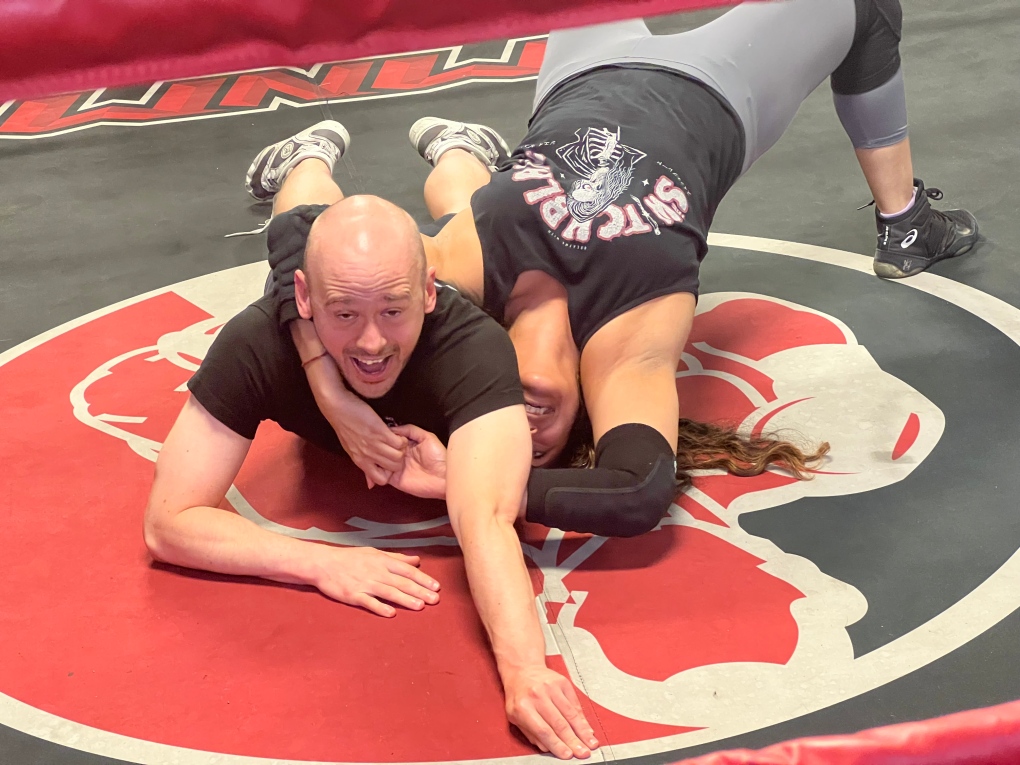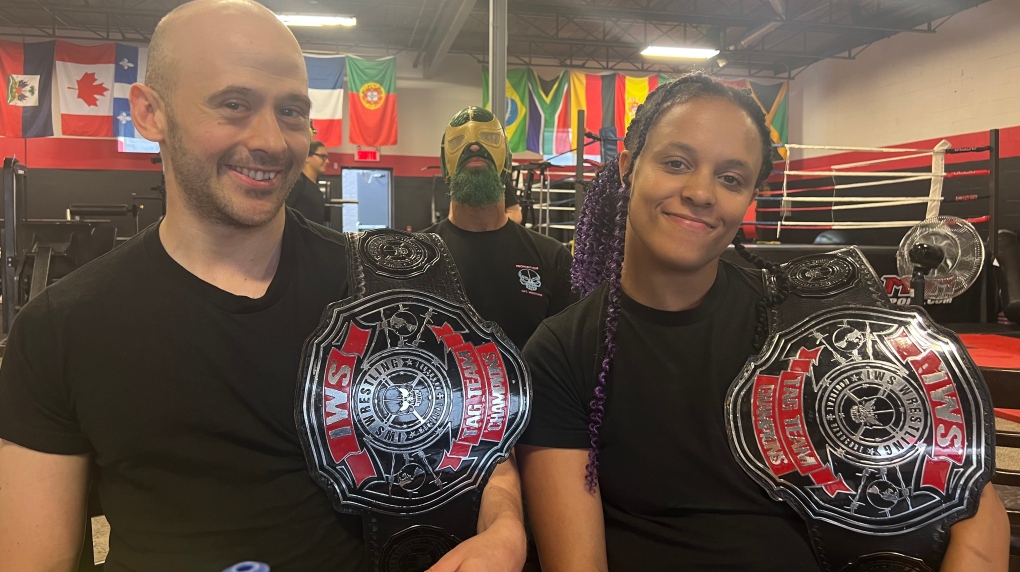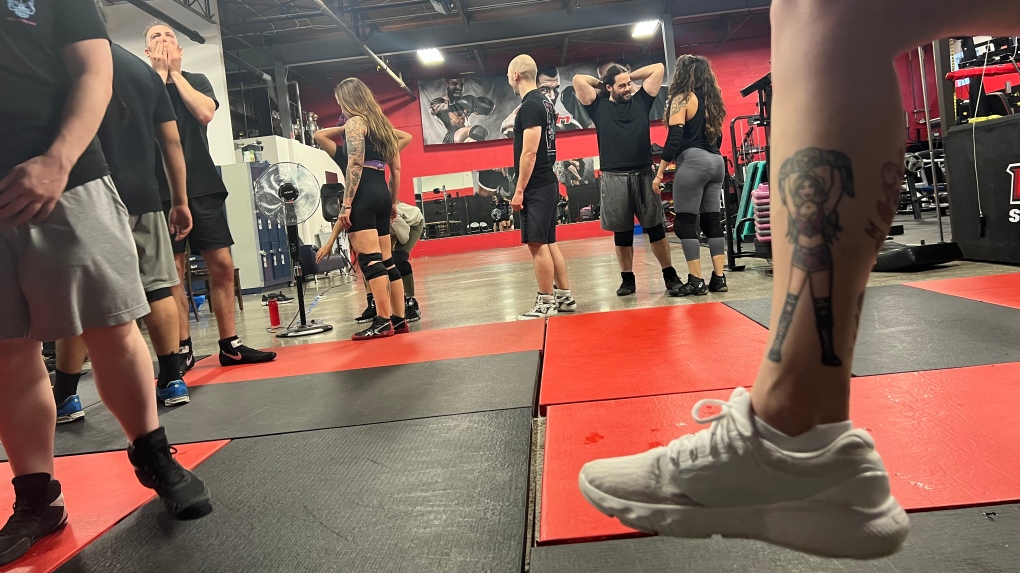Hardcore Montreal wrestling syndicate hosts diverse wrestling show
When "The Professor" Shayne Hawk started wrestling in Montreal two decades ago, the culture was toxic.
When he started coaching and running the International Wrestling Syndicate (IWS), he wanted that to change.
"There was a lot of bullying in wrestling when I came up, and I knew that I didn't want to pass that on, so in order to break that generational trauma, what we did here is become much more accepting and I think the results speak for themselves," said Hawk.
Hawk will be part of the Scarred 4 Life IWS event at the Olympia Saturday night. It is being promoted as the most diverse wrestling event Montreal has seen. Trans wrestler Dark Shiek was on the card originally but was detained at the border and was replaced for her heavyweight title fight.
Gay Quebec wrestler Alex Maze said the IWS fans were quick to embrace him for who he is.
"The first show I came in as staff, I was wearing a shirt that says 'gay is not okay, it's fabulous,' just to see how people would react. No reaction at all," he said.
Though he said some fans in smaller venues with other circuits have shouted homophobic taunts at him, those in Montreal watching IWS shows have always had his back in the ring.
"With IWS, we don't have that issue," he said. "IWS, I step into the ring, [and] they know what to get ready for."
 Alex Maze said IWS fans, staff and fellow wrestlers have his back and that him being gay is no obstacle to being accepted and supported in the IWS. (Daniel J. Rowe/CTV News)
Alex Maze said IWS fans, staff and fellow wrestlers have his back and that him being gay is no obstacle to being accepted and supported in the IWS. (Daniel J. Rowe/CTV News)
Kristara said being inclusive is a no-brainer for wrestling in 2023.
"We're all different. If I'm watching a show and don't see someone that looks like me, I can't relate as well, or I might not feel as into it," she said.
 The Green Phantom will team up with gay wrestler Alex Maze and his partner Kristara The Sweetest Pea as part of what they're calling the most diverse wrestling spectacle in Montreal's history. (Daniel J. Rowe/CTV News)
The Green Phantom will team up with gay wrestler Alex Maze and his partner Kristara The Sweetest Pea as part of what they're calling the most diverse wrestling spectacle in Montreal's history. (Daniel J. Rowe/CTV News)
"The Brightest Light in the Room" Dani Leo will square off against IWS Women's Champion Melanie Havok. Leo said she when she fights "the Classy Kind of Trashy" from Laval, Que., she wants to be an example for girls who may want to get into the ring.
"The fact that I get to be that now for other little girls in the crowd, that means everything to me because I didn't have that growing up. I want to be the person that I wish I had," she said.
Those in the IWS crew remember seeing wrestlers in the past mocking their ethnic identity or sexual orientation.
"There are certain stereotypes, especially when you're a person of colour - you might be the villain, you might be something really outrageous that you don't identify with," said Kristara.
"When I was growing up, LGBT [people] were a mockery," said Maze. "There was Billy and Chuck, there was Rico, it was always a straight man doing 'gay-type' archetype, it was stereotypes. It was breaking people, tearing us down."
These wrestlers want to build each other up as people while suplexing them on the mat.
Havok said as a female wrestling champion, she wants to make sure others have the chance to succeed as she has.
"If we don't deliver, it's said it's because we're a woman, we don't belong in the industry, but we are trying right now to change things and we are showing people what we can do," she said.
 "The Classy Kind of Trashy" women's champion Melanie Havok says she fights her opponents in the ring hard, but also fights to help them succeed. (Daniel J. Rowe/CTV News)
"The Classy Kind of Trashy" women's champion Melanie Havok says she fights her opponents in the ring hard, but also fights to help them succeed. (Daniel J. Rowe/CTV News)
Though the show-runner Hawk knows there is still work to do in the industry, he will not stop pushing toxicity out and embracing diversity.
"The results speak for themselves," he said. "When you're able to give people are more open and welcoming environment to perform and to be themselves, you tend to get a better performance from them."
 Wrestling in Quebec is literally tattooed on the bodies of some, as fans get set for the most diverse show in Montreal's history on July 15, 2023. (Daniel J. Rowe/CTV News)
Wrestling in Quebec is literally tattooed on the bodies of some, as fans get set for the most diverse show in Montreal's history on July 15, 2023. (Daniel J. Rowe/CTV News)
CTVNews.ca Top Stories

Canada could impose tariffs on U.S. steel, orange juice in response to Trump threat
Canadian officials are narrowing a list of American products to target in the event the federal government must respond to U.S. tariffs on Canadian goods, CTV News has confirmed.
Convicted Jan. 6 rioter arrested as fugitive in Whistler, B.C.
An American citizen convicted of participating in the Jan. 6, 2021, riot on Capitol Hill who said he was seeking asylum in Canada has been arrested as a "fugitive from U.S. justice," according to authorities.
Can the U.S. really make Canada the 51st state?
Talk of Canada becoming the 51st American state has raised an existential question on this side of the border: Could it be done? Could the maple leaf make way to the stars and stripes? According to several experts, it may be possible, but not painless.
L.A. wildfires continue to devastate area, Canada prepared to offer expertise
A series of wildfires are searing through the Los Angeles area, forcing many to evacuate their homes. Here's everything that happened throughout Jan. 8.
'True when I said it, true today': former Canadian PM Harper pushes back against Trump on social media
Former Canadian Prime Minister Stephen Harper doesn’t find president-elect Donald Trump’s jibes about Canada becoming the 51st U.S. state very amusing.
Ontario Premier Doug Ford says he is 'OK' after OPP vehicle he was in was 'sideswiped' in Highway 401 collision
Ontario Premier Doug Ford was uninjured after an OPP vehicle he was travelling in was involved in a collision on Highway 401 earlier today.
At least 60 University of Guelph students sick as 'cluster of illness' hits residence
The University of Guelph is dealing with what they are calling a ‘cluster of illness’ among students living in residence.
Energy minister 'committed' to consumer carbon tax as he considers Liberal leadership
Energy and Natural Resources Minister Jonathan Wilkinson says he would be 'committed' to the consumer carbon tax should he become Liberal leader and prime minister, despite the policy’s unpopularity.
New ranking suggests Canada passport among 'top 5 losers' in the world
A new global ranking may raise doubts about Canada's reputation of being open to other countries.
































